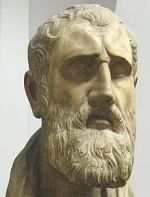| Home - Back Issues - The Team - Contact Us |
 |
| Volume 10 |Issue 37 | September 30, 2011 | |
|
|
Science Zeno's Achilles and the Tortoise Syed Fattahul Alim
But don't hurry to reach such a conclusion. Do you know what the great twentieth century physicist Albert Einstein said about commonsense? To him it (common sense) was nothing but the collection of prejudices acquired by age eighteen. If we have any regard for Einstein and his theories of motion that revolutionised modern science, then this argument against commonsense, too, needs to be taken seriously. In that case, the demands of the commonsense to take the possibility of motion for granted loses much of its ground. But Einstein was not against motion as such, though he was certainly not for understanding motion from any commonsensical standpoint.
It was long time ago that Zeno, a pre-Socratic philosopher of Elea in ancient (490 BC-430 BC) Greece, who challenged the concept of motion through his famous paradoxes. He belonged to the Eleatic school of philosophy founded by the philosopher-poet Parmenides (early 5th century BCE).. One of his paradoxes titled 'Achilles and the tortoise,' as stated by Aristotle, argues that however fast the fastest runner Achilles may run, he will never be able to catch the slow moving tortoise. “In a race, the quickest runner can never overtake the slowest, since the pursuer must first reach the point whence the pursued started, so that the slower must always hold a lead” This is not exactly like the tortoise of the Aesop's fables fame, which beat the too confident hare, since he (the hare) just slept away his chances of winning the race. But the Achilles of this paradox cannot outdo the tortoise because the dialectical argument of Zeno denies him (Achilles) the possibility of beating the tortoise. In the ultimate analysis, it is really not Achilles, but motion itself, that is suspect, and in fine defeated by the force of reasoning. Let us see how the argument goes. Since the tortoise is too slow, Achilles offers it a privilege of head start of say 20 feet. Supposing that both of them runs at a constant speed (though Achilles is fast and the tortoise is slow), after the elapse of some measurable time Achilles would reach the point 20 feet away, where the tortoise started from. Take it as the point 0. But meanwhile the tortoise must have traversed some distance, say, five feet! Call it point 1. So, Achilles will have to cover the five feet path, before he may catch the tortoise at point 1. But again, the tortoise must have moved further (a length shorter than five feet, though), to reach, say, point 2. Surely, Achilles will need to cross that length ending at point 2, too, before reaching the tortoise. But as soon as he reaches point 2, the tortoise has inched away to point 3. In this manner, every next point such as point 4, 5, 6, and so on that the tortoise crosses, Achilles will have to reach there before he may catch the tortoise. Following this line of reasoning, the fast runner Achilles will, of course, come closer and closer to the tortoise in a gradual fashion. But will the race ever come to an end? It will never end in measurable time. And if Achilles can never reach the tortoise, what is the meaning of being fast? And if the fast mover cannot ever overtake the slow mover in measurable time, then what is the use or meaning of motion? Is it not then a mere illusion, so argues Zeno? That in other words means that motion is not possible. This is how Zeno dismissed the possibility of motion through his first paradox of Achilles and the tortoise.
Copyright
(R) thedailystar.net 2011 |

